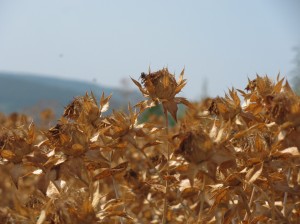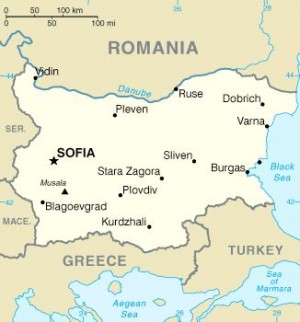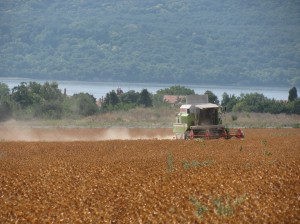May 23, 2014
Building a safflower traceability system in Bulgaria
Promar consultants often go in the field (literally!) in order to assist clients in solving business dilemmas. Senior Consultant Tina Peneva tells about her experience in solving a raw material supply issue in Bulgaria.
 Safflower (Carthamus tinctorius) is an annual oilseed crop that resembles a thistle. Its seeds are rich in oil and the flowers are used for the manufacture of yellow dyes. It is not a major crop and the global safflower production totals about 500,000 MT annually. There are more than 60 countries involved in safflower production, the largest ones being India, USA, Mexico, as well as China, Kazakhstan and Ethiopia.
Safflower (Carthamus tinctorius) is an annual oilseed crop that resembles a thistle. Its seeds are rich in oil and the flowers are used for the manufacture of yellow dyes. It is not a major crop and the global safflower production totals about 500,000 MT annually. There are more than 60 countries involved in safflower production, the largest ones being India, USA, Mexico, as well as China, Kazakhstan and Ethiopia.
In addition to its more traditional end uses for oil and for birdseed, in the past 10 years safflower seeds have increasingly been used in food supplements, including Bulgarian seeds.
Overall, Bulgaria supplies just a small share of the global safflower production. The majority of Bulgarian safflower is marketed mainly as bird feed. However, premium quality safflower seeds can be used for human consumption and food supplement production. Producing safflower seeds for human consumption requires very careful post-harvest handling in order to avoid the growth of aflatoxin mold which is dangerous for humans.
 In Promar’s case, the safflower exporter and importer faced various difficulties, right from the initial phase of safflower sourcing from Bulgaria. The Bulgarian side could not understand the strict requirements the Japanese buyer laid out in regard to harvesting, storage and transportation of safflower. On the other hand, the Japanese buyer was not able to have hands-on control over the process in Bulgaria due to distance, as well as a shortage of manpower.
In Promar’s case, the safflower exporter and importer faced various difficulties, right from the initial phase of safflower sourcing from Bulgaria. The Bulgarian side could not understand the strict requirements the Japanese buyer laid out in regard to harvesting, storage and transportation of safflower. On the other hand, the Japanese buyer was not able to have hands-on control over the process in Bulgaria due to distance, as well as a shortage of manpower.
These major communication problems and lack of a person in charge of quality control were threatening to derail the project.
When Promar Consulting stepped in, we first made sure that “everybody was speaking the same language”, i.e. there were no information gaps or unclear points in terms of what the Japanese buyer’s requirements were and whether the requirements were achievable. The most important challenge in the process was to prevent aflatoxin mold from growing in the harvested safflower, which would make the seeds unusable for human consumption.
After a number of meetings and discussions, the project team including the importer, the exporter and Promar consultants outlined a traceability system for monitoring the pre-harvest, harvest and post-harvest handling of safflower seeds before they are exported. The traceability system included clear actions at each step that were meticulously recorded for future analysis.
Pre-harvest: checking everything twice
We prepared detailed check lists to be completed by the Bulgarian exporter with details about the agrochemical product use, soil treatment, the condition of the harvesting combine and the transporting truck, weather details, among other points. Promar consultants facilitated this process and made sure the tasks were understood correctly and completed in a timely manner.
Harvest: recording every detail of the process
 As usually happens in agriculture, the exact harvest period is hard to predict. This was one of the difficulties that the overseas safflower buyer facedl; it was impossible to fly over to Bulgaria on short notice to directly monitor the safflower harvest. Instead, our Bulgaria-based consultant was on stand-by for a week prior to harvest, waiting to be called to observe the harvest at the best possible, i.e. the driest, time.
As usually happens in agriculture, the exact harvest period is hard to predict. This was one of the difficulties that the overseas safflower buyer facedl; it was impossible to fly over to Bulgaria on short notice to directly monitor the safflower harvest. Instead, our Bulgaria-based consultant was on stand-by for a week prior to harvest, waiting to be called to observe the harvest at the best possible, i.e. the driest, time.
During the harvest, we recorded each step of the process, including keeping track of atmospheric temperature, and humidity. This information was necessary in order to track any possibility of aflatoxin mold growth during the harvest.
Post-harvest: documenting and analyzing
Promar’s involvement in the post-harvest processes included documenting and monitoring the safflower cleaning and drying process at the cleaning facility, as well as putting the seeds into bags and preparing them for storage. During this process our consultant took seed samples which were sent for analysis prior shipment.
The joint effort between buyer, seller and Promar consultants proved to be efficient on many levels. Communication was smooth, since gaps in language and business culture were eliminated. All parties involved better understood the buyer’s requirements and therefore followed them closely, which resulted in a successful harvest of safflower seeds from Bulgaria.
Promar has done numerous projects assisting companies, industrial organizations and farmers in solving supply issues. If you are interested in learning more, please contact us.
